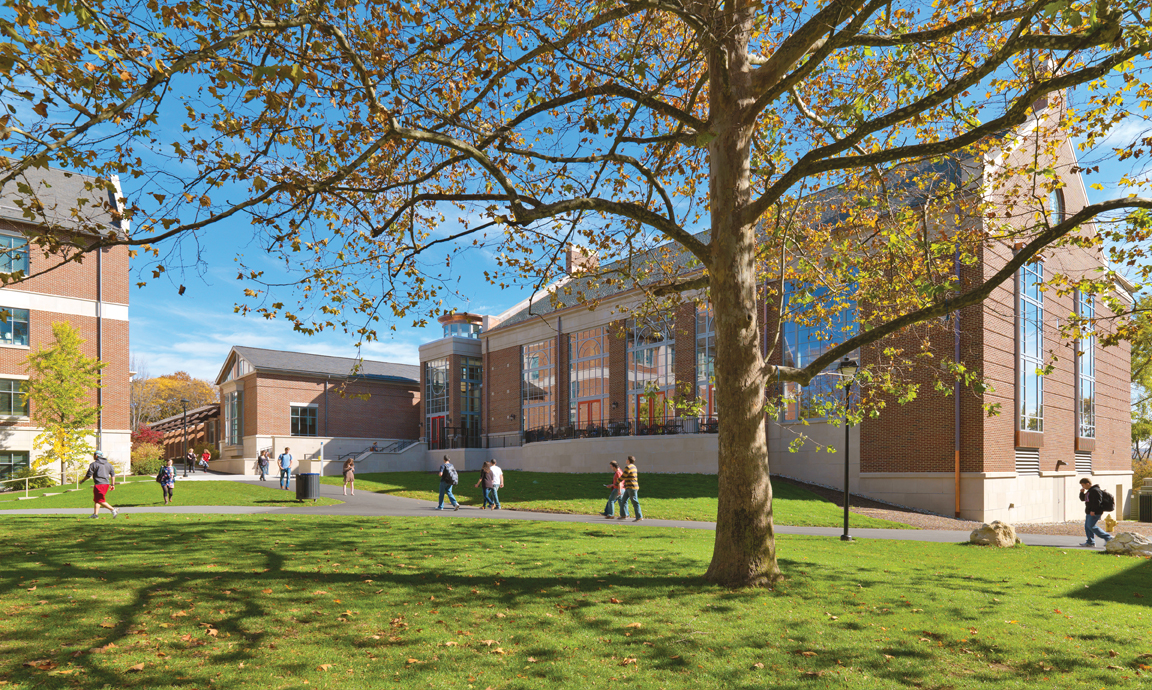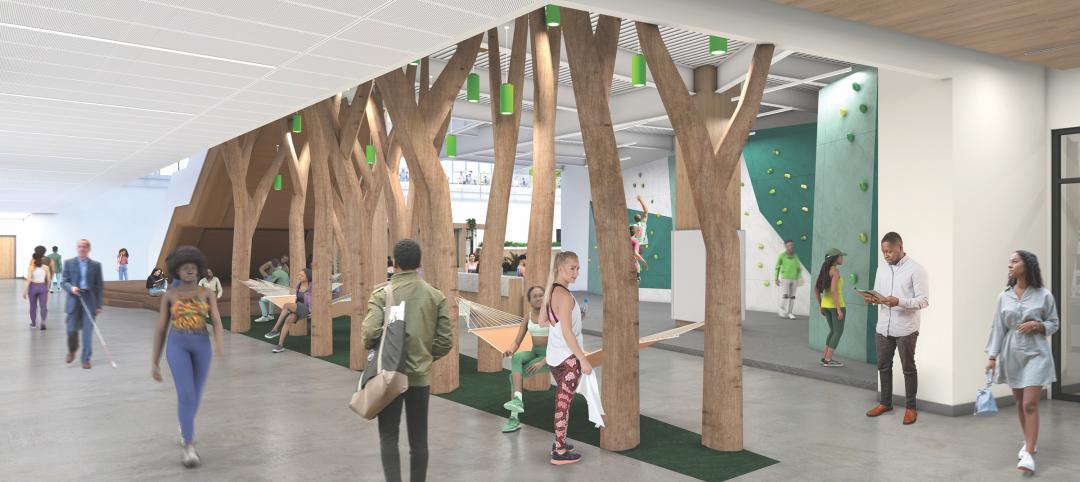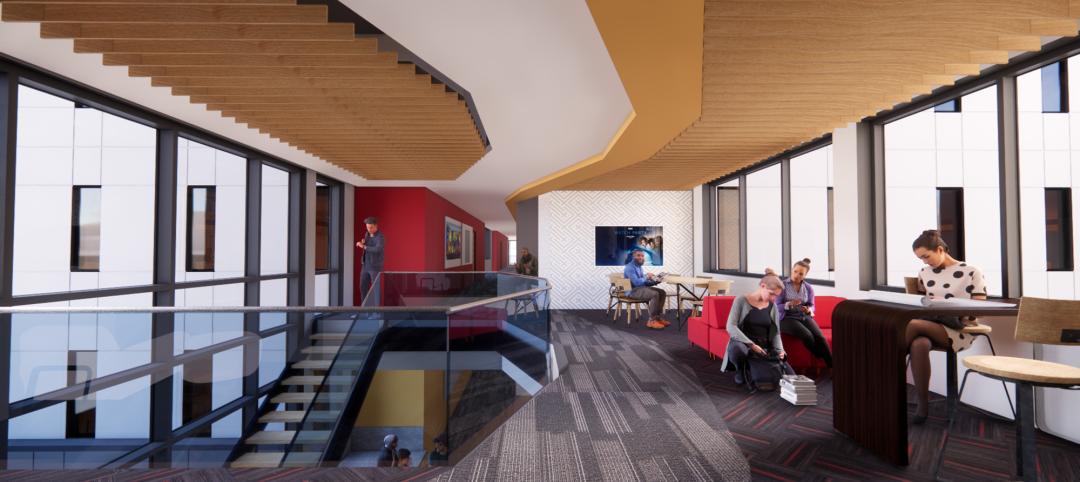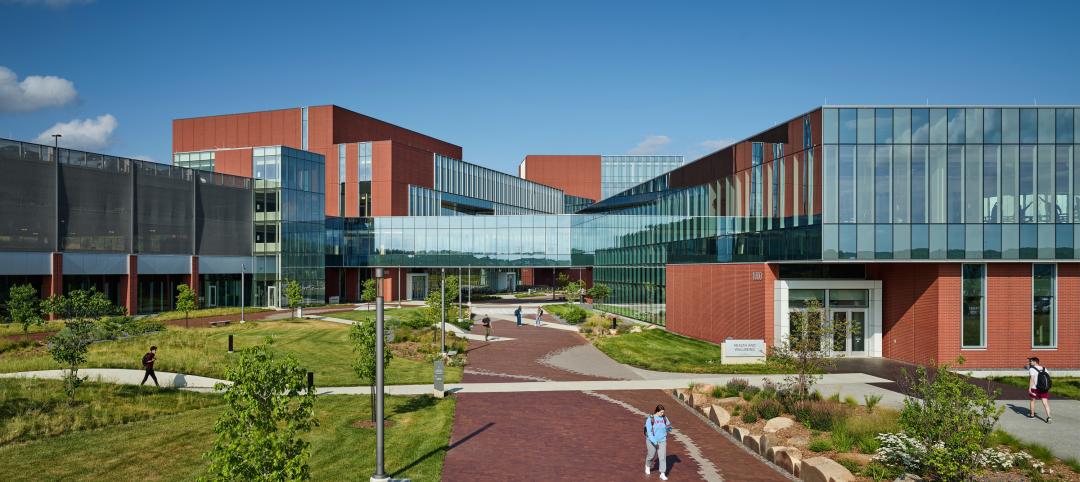At many colleges and universities, the student union serves as the focal point of campus activity. These days, campus planners are increasingly designing student unions as a multifunctional home to fuse student life and recreational activities under one roof.
Two years ago, Muhlenberg College, Allentown, Pa., embarked on a bold expansion and renovation project to dramatically upgrade the outdated Seegers Student Union.
The building was originally constructed in 1960 when enrollment just topped a thousand students. Despite previous expansions and renovations, the 66,000-sf student union was too tired, worn, and undersized to serve as a modern-day campus center for more recent needs of up to 3,300 guests per day.
Ultimately, college officials decided to transform the Seegers Student Union into a contemporary student dining and commons facility to meet the college’s growing, diverse needs.
PROJECT SUMMARY
Seegers Student Union, Muhlenberg College
Allentown, Pa.Building Team
Submitting firm: Bruner/Cott & Associates
Owner/developer: Muhlenberg College
Structural engineer: Barry Isett & Associates
Mechanical engineer: Snyder Hoffman Associated Inc.
General contractor: Alvin H. Butz Inc.General Information
Size: 70,000 sf
Construction cost: $20 million
Construction period: August 2008 to August 2010
Putting The Emphasis on Community Ideals
The Muhlenberg campus is located along a high ridge with a view of the Lehigh Valley. The architectural vocabulary reflects both English and German design traditions.
The 30,000-sf expansion and reconstruction focused on centralizing the Student Life and Student Organization offices, expanding the informal social space, and, most importantly, developing a 600-seat dining facility that could support the strong sense of community within the college.
In an effort to influence design criteria and create a sense of ownership with the Muhlenberg campus population, the Building Team relied on direct and indirect feedback with students, staff, and faculty. “We conducted a number of focus groups and hung a series of comment boards on which students wrote their suggestions, comments, and wishes for the Seegers Student Union,” says Dana Kelly, marketing director with design firm Bruner/Cott & Associates, Cambridge, Mass. “There was a lot of emphasis on the desire to ‘create a living room on campus’ that would serve as a neutral ground for all constituencies.” This factor influenced the social aspects of the design.
Senior staff members from the college served as the Steering Committee and helped clarify the project’s goals. “From an admissions perspective, it was important that the institution respond more deeply to the observances of Jewish students who make up one-third of the student body,” says Glenn Gerchman, director of Seegers Student Union. Maintaining a “strong sense of community” was also crucial. “That’s a characteristic recognized by nearly everyone who walks down Muhlenberg’s academic row,” he says.
Because the Seegers Student Union abuts the principal east-west pathway on the west end of the main quad, students, staff, and faculty were able to track construction progress. Not letting an educational opportunity pass, the Building Team created a Progress Plaza near the construction site where information about the project and its progress was continuously posted, according to Kelly.
Developing The Focal Point on Campus
The Building Team was charged with designing a facility that met a wide range of student dietary requirements and restrictions. One is the Noshery, a new kosher station that has two separate kitchens—one for meat preparation, one for dairy prep. “We believe this is the first fully integrated kosher station on a college campus,” says Kelly. “Integrated meaning that it is not segregated from the other stations like other kosher stations.”
The new food gallery also brings the kitchen out in the open. Food is prepared in a display-cooking format in front of the students, which brings food to students faster while reducing waste and labor cost.
“The response to this format has been tremendous,” says Gerchman. “The meal plan counts are up, and the students have responded favorably all around.”
The reconstructed 600-seat dining room has become a hearthstone visible from the surrounding campus. It can also host a wide variety of campus events. The Light Lounge serves as an active living room, while an outdoor terrace overlooking Brown Mall rounds out the amenities of the structure.
Designed for LEED Gold guidelines but not LEED-certified, the Seegers Student Union incorporates multiple sustainable measures: low-VOC paints and adhesives, recycled tile and carpet, renewable lumber and millwork, a spray-foam insulated building envelope, and integral air and vapor barriers.
“The new Seegers Student Union now completes a new quadrangle on the campus, providing students with an important connection to the outdoors,” says Kelly.
Seegers Student Union defines a new campus space for Muhlenberg College that reinforces the unified structure of the campus. The building balances the institutional ambitions of the college with a desire to be aesthetically and socially innovative. +
Delivery method: Design-bid-build
Related Stories
Construction Costs | Oct 16, 2024
Construction Crane Index: Most major markets’ crane counts increase or hold steady in third quarter
Rider Levett Bucknall’s (RLB’s) latest Crane Index and Quarterly Cost Report shows continued decreasing cost inflation and crane counts increasing or holding steady in 10 of the 14 major markets it surveyed. The national average increase in construction costs was 1.07%, the lowest it’s been in the last three years.
AEC Tech | Oct 16, 2024
How AI can augment the design visualization process
Blog author Tim Beecken, AIA, uses the design of an airport as a case-study for AI’s potential in design visualizations.
University Buildings | Oct 15, 2024
Recreation and wellness are bedfellows in new campus student centers
Student demands for amenities and services that address their emotional and mental wellbeing are impacting new development on college campuses that has led to recreation centers with wellness portfolios.
Higher Education | Oct 14, 2024
Higher education design for the first-gen college student
In this Design Collaborative blog, Yogen Solanki, Assoc. AIA, shares how architecture and design can help higher education institutions address some of the challenges faced by first-generation students.
Performing Arts Centers | Oct 10, 2024
Studio Gang's performing arts center for Hudson Valley Shakespeare breaks ground
A new permanent home for Hudson Valley Shakespeare, a professional non-profit theater company, recently broke ground in Garrison, N.Y. The Samuel H. Scripps Theater Center includes a 14,850 sf performance venue that will serve as a permanent home for the theater company known for its sweeping open-air productions of classics and new works.
Sustainable Design and Construction | Oct 10, 2024
Northglenn, a Denver suburb, opens a net zero, all-electric city hall with a mass timber structure
Northglenn, Colo., a Denver suburb, has opened the new Northglenn City Hall—a net zero, fully electric building with a mass timber structure. The 32,600-sf, $33.7 million building houses 60 city staffers. Designed by Anderson Mason Dale Architects, Northglenn City Hall is set to become the first municipal building in Colorado, and one of the first in the country, to achieve the Core certification: a green building rating system overseen by the International Living Future Institute.
3D Printing | Oct 9, 2024
3D-printed construction milestones take shape in Tennessee and Texas
Two notable 3D-printed projects mark milestones in the new construction technique of “printing” structures with specialized concrete. In Athens, Tennessee, Walmart hired Alquist 3D to build a 20-foot-high store expansion, one of the largest freestanding 3D-printed commercial concrete structures in the U.S. In Marfa, Texas, the world’s first 3D-printed hotel is under construction at an existing hotel and campground site.
University Buildings | Oct 9, 2024
Des Moines University Medicine and Health Sciences opens a new 88-acre campus
Des Moines University Medicine and Health Sciences has opened a new campus spanning 88 acres, over three times larger than its previous location. Designed by RDG Planning & Design and built by Turner Construction, the $260 million campus features technology-rich, flexible educational spaces that promote innovative teaching methods, expand research activity, and enhance clinical services. The campus includes four buildings connected with elevated pathways and totaling 382,000 sf.
Student Housing | Oct 9, 2024
University of Maryland begins work on $148 million graduate student housing development
The University of Maryland, in partnership with Campus Apartments and Mosaic Development Partners, has broken ground on a $148.75 million graduate student housing project on the university’s flagship College Park campus. The project will add 741 beds in 465 fully furnished apartments.
Healthcare Facilities | Oct 9, 2024
How healthcare operations inform design
Amanda Fisher, Communications Specialist, shares how BWBR's personalized approach and specialized experience can make a meaningful impact to healthcare facilities.

















